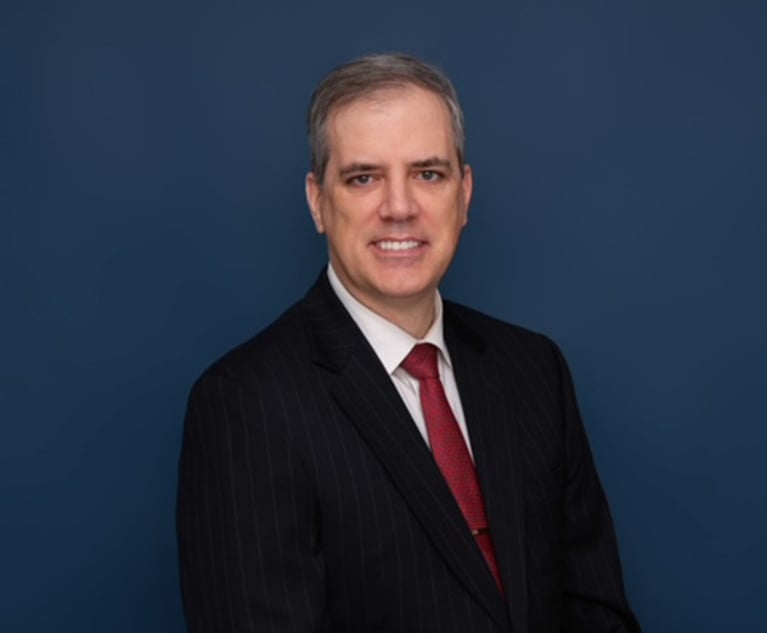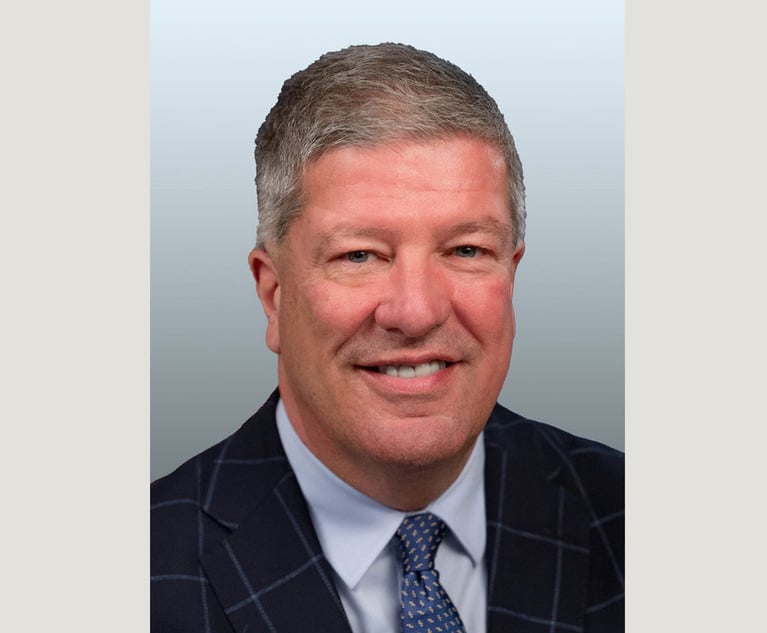Superior Court, Again Applying 'Bristol-Myers,' Keeps Medical Device Case in Philadelphia
In yet another case that required the Pennsylvania Superior Court to apply the U.S. Supreme Court's landmark 2017 decision in Bristol-Myers Squibb v. Superior Court of California, a state appellate panel has ruled that claims over a woman's death allegedly caused by a contaminated endoscope can stay in Pennsylvania despite the fact that the scope manufacturer is based in Japan and the death occurred in North Carolina.
April 17, 2019 at 06:07 PM
5 minute read
 Benjamin Franklin bridge in Philadelphia. Photo: Shutterstock
Benjamin Franklin bridge in Philadelphia. Photo: Shutterstock
In yet another case that required the Pennsylvania Superior Court to apply the U.S. Supreme Court's landmark 2017 decision in Bristol-Myers Squibb v. Superior Court of California, a state appellate panel has ruled that claims over a woman's death allegedly caused by a contaminated endoscope can stay in Pennsylvania despite the fact that the scope manufacturer is based in Japan and the death occurred in North Carolina.
In a published April 10 opinion in Vaughan v. Olympus America, a three-judge panel of the Superior Court unanimously reversed a Philadelphia trial judge's rulings that sustained defendant Olympus Medical System Corp.'s (OMSC) preliminary objections seeking dismissal for lack of personal jurisdiction and dismissed claims against three remaining defendants—Olympus America (OAI), Olympus Corporation of the Americas (OCA) and Custom Ultrasonics (Custom)—for forum non conveniens.
“In sum, faced with private and public factors that clearly support Vaughan's choice to proceed in Philadelphia, we conclude there were not weighty reasons to disturb Vaughan's choice of forum,” Judge Maria McLaughlin wrote for the panel, which also included President Judge Jack Panella and Judith Ference Olson.
According to the opinion, Freeman Maurice Vaughan Jr. brought the lawsuit on behalf of the estate of his late wife, who died in May 2015 after developing a multidrug-resistant infection allegedly caused by a contaminated Olympus-made duodenoscope used in a procedure at Carolinas Medical Center in Charlotte, North Carolina.
Vaughan's claims center on the allegation that the defendants' protocol for “reprocessing” the scopes—sterilizing them so that they could be used over and over on multiple patients—was inadequate, according to the panel's opinion.
OMSC, which allegedly designed and manufactured the scope, is a Japanese corporation based in Tokyo, according to McLaughlin. OCA and OAI—which are allegedly involved in marketing, distribution and post-market safety surveillance of the scope—are New York corporations, with headquarters in Center Valley, Pennsylvania. Custom is a Pennsylvania company headquartered in Ivyland and, relying on OMSC's reprocessing protocol, allegedly designed, manufactured and tested an automated endoscope reprocessor.
Laura Storms, OCA's vice president of regulatory and clinical affairs and quality assurance, swore in an affidavit that, for the purposes of meeting U.S. Food and Drug Administration requirements, OCA is a United States agent of OMSC, according to McLaughlin.
While the trial court had determined that Pennsylvania could not exercise specific jurisdiction over OMSC, the appellate panel agreed with Vaughan's argument that jurisdiction was proper because “'the acts of the corporations which were affiliated with OMSC, and which were acting as its agent in Pennsylvania, engaged in significant conduct that was directly related to the [plaintiff's] claims here.'”
McLaughlin said the panel derived “useful guidance” from Bristol-Myers Squibb, which made clear that defendants cannot be sued in jurisdictions where they haven't conducted business directly linked to the claimed injury.
In Bristol-Myers, McLaughlin noted, the high court discussed circumstances not present in that case that would have allowed for specific jurisdiction, including allegations that “'[Bristol-Myers] engaged in relevant acts together with [the California company],'” and that “'[Bristol-Myers] is derivatively liable for [the California company's] conduct in California.'”
McLaughlin said those circumstances were present in the Vaughan case.
“Here, OMSC engaged in relevant acts together with OCA, an in-state company, and it is liable for OCA's FDA-related conduct in Pennsylvania,” McLaughlin said. ”OCA's vice president, Laura Storms, admitted in her affidavit that OCA is OMSC's agent for purposes of OMSC's statutory reporting requirements with the FDA. She also conceded that the agency relationship extends to OMSC's Section 510(k) premarket notifications. Section 510(k) premarket notifications entail submission of proposed directions for use. OMSC itself fashions the reprocessing protocol, through 'instructions,' and all of Vaughan's claims relate to adequacy of that protocol. OCA's activities in concert with OMSC, and as OMSC's agent, are sufficiently linked to Vaughan's substantive claims to support specific jurisdiction over OMSC in Pennsylvania.”
As for the dismissal of the remaining defendants for forum non conveniens, McLaughlin said the trial court erred in determining that North Carolina was the more appropriate jurisdiction.
“The trial court determined that the majority of relevant evidence in this case is located in North Carolina or Japan and not, as Vaughan asserts, in Pennsylvania,” McLaughlin said. ”However, we agree with Vaughan that a plaintiff may establish a close connection with a forum based upon 'relevant corporate actions' that take place there.”
“There is little doubt that OCA and OAI conduct extensive operations in Pennsylvania, in relative proximity to Philadelphia,” McLaughlin continued. “Further, Vaughan has identified OCA and OAI employees, as well as numerous Custom employees, all located in the greater Philadelphia area.”
McLaughlin also took issue with the trial judge factoring into his decision the concern that Vaughan's fact witnesses for damages are located in North Carolina.
“In our view, any difficulty a plaintiff faces in securing evidence necessary to prove a cause of action is not a valid reason to override the plaintiff's forum preference,” McLaughlin said.
Vaughan's attorney, Brian Panish of Panish Shea & Boyle in Los Angeles, said, “The court got it right. It was the Japanese corporation's own affidavit that showed they control the operation and that was what the court of appeals based its decision on, at least partly. And now we're traveling to Japan for depositions as we speak. We look forward to trying the case in front of a jury in the Court of Common Pleas.”
Counsel for the Olympus defendants, Candace Ali Blydenburgh of McGuireWoods in Richmond, Virginia, and counsel for Custom Ultrasonics, David Volk of Cipriani & Werner in Blue Bell, could not be reached for comment.
This content has been archived. It is available through our partners, LexisNexis® and Bloomberg Law.
To view this content, please continue to their sites.
Not a Lexis Subscriber?
Subscribe Now
Not a Bloomberg Law Subscriber?
Subscribe Now
NOT FOR REPRINT
© 2025 ALM Global, LLC, All Rights Reserved. Request academic re-use from www.copyright.com. All other uses, submit a request to [email protected]. For more information visit Asset & Logo Licensing.
You Might Like
View All


Stevens & Lee Hires Ex-Middle District of Pennsylvania U.S. Attorney as White-Collar Co-Chair
3 minute read
Judge Tanks Prevailing Pittsburgh Attorneys' $2.45M Fee Request to $250K
5 minute readTrending Stories
- 1Law Firms Expand Scope of Immigration Expertise, Amid Blitz of Trump Orders
- 2Latest Boutique Combination in Florida Continues Am Law 200 Merger Activity
- 3Sarno da Costa D’Aniello Maceri LLC Announces Addition of New Office in Eatontown, NJ, and Named Partner
- 4Friday Newspaper
- 5Public Notices/Calendars
Who Got The Work
J. Brugh Lower of Gibbons has entered an appearance for industrial equipment supplier Devco Corporation in a pending trademark infringement lawsuit. The suit, accusing the defendant of selling knock-off Graco products, was filed Dec. 18 in New Jersey District Court by Rivkin Radler on behalf of Graco Inc. and Graco Minnesota. The case, assigned to U.S. District Judge Zahid N. Quraishi, is 3:24-cv-11294, Graco Inc. et al v. Devco Corporation.
Who Got The Work
Rebecca Maller-Stein and Kent A. Yalowitz of Arnold & Porter Kaye Scholer have entered their appearances for Hanaco Venture Capital and its executives, Lior Prosor and David Frankel, in a pending securities lawsuit. The action, filed on Dec. 24 in New York Southern District Court by Zell, Aron & Co. on behalf of Goldeneye Advisors, accuses the defendants of negligently and fraudulently managing the plaintiff's $1 million investment. The case, assigned to U.S. District Judge Vernon S. Broderick, is 1:24-cv-09918, Goldeneye Advisors, LLC v. Hanaco Venture Capital, Ltd. et al.
Who Got The Work
Attorneys from A&O Shearman has stepped in as defense counsel for Toronto-Dominion Bank and other defendants in a pending securities class action. The suit, filed Dec. 11 in New York Southern District Court by Bleichmar Fonti & Auld, accuses the defendants of concealing the bank's 'pervasive' deficiencies in regards to its compliance with the Bank Secrecy Act and the quality of its anti-money laundering controls. The case, assigned to U.S. District Judge Arun Subramanian, is 1:24-cv-09445, Gonzalez v. The Toronto-Dominion Bank et al.
Who Got The Work
Crown Castle International, a Pennsylvania company providing shared communications infrastructure, has turned to Luke D. Wolf of Gordon Rees Scully Mansukhani to fend off a pending breach-of-contract lawsuit. The court action, filed Nov. 25 in Michigan Eastern District Court by Hooper Hathaway PC on behalf of The Town Residences LLC, accuses Crown Castle of failing to transfer approximately $30,000 in utility payments from T-Mobile in breach of a roof-top lease and assignment agreement. The case, assigned to U.S. District Judge Susan K. Declercq, is 2:24-cv-13131, The Town Residences LLC v. T-Mobile US, Inc. et al.
Who Got The Work
Wilfred P. Coronato and Daniel M. Schwartz of McCarter & English have stepped in as defense counsel to Electrolux Home Products Inc. in a pending product liability lawsuit. The court action, filed Nov. 26 in New York Eastern District Court by Poulos Lopiccolo PC and Nagel Rice LLP on behalf of David Stern, alleges that the defendant's refrigerators’ drawers and shelving repeatedly break and fall apart within months after purchase. The case, assigned to U.S. District Judge Joan M. Azrack, is 2:24-cv-08204, Stern v. Electrolux Home Products, Inc.
Featured Firms
Law Offices of Gary Martin Hays & Associates, P.C.
(470) 294-1674
Law Offices of Mark E. Salomone
(857) 444-6468
Smith & Hassler
(713) 739-1250





